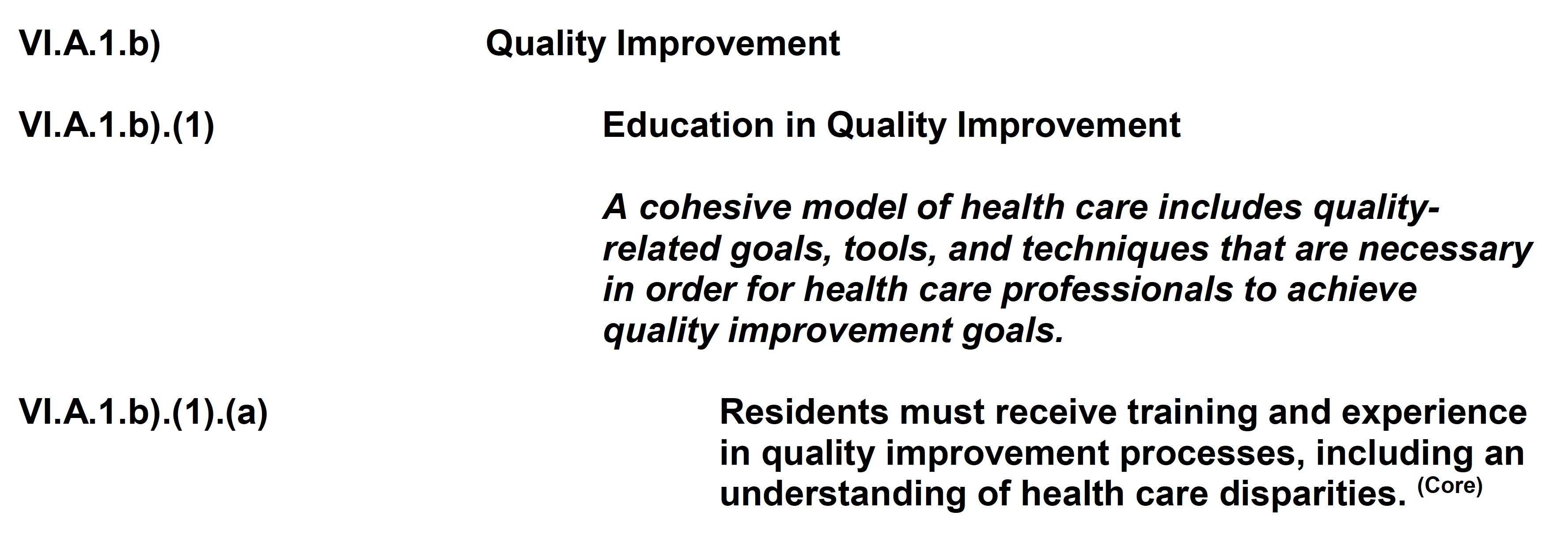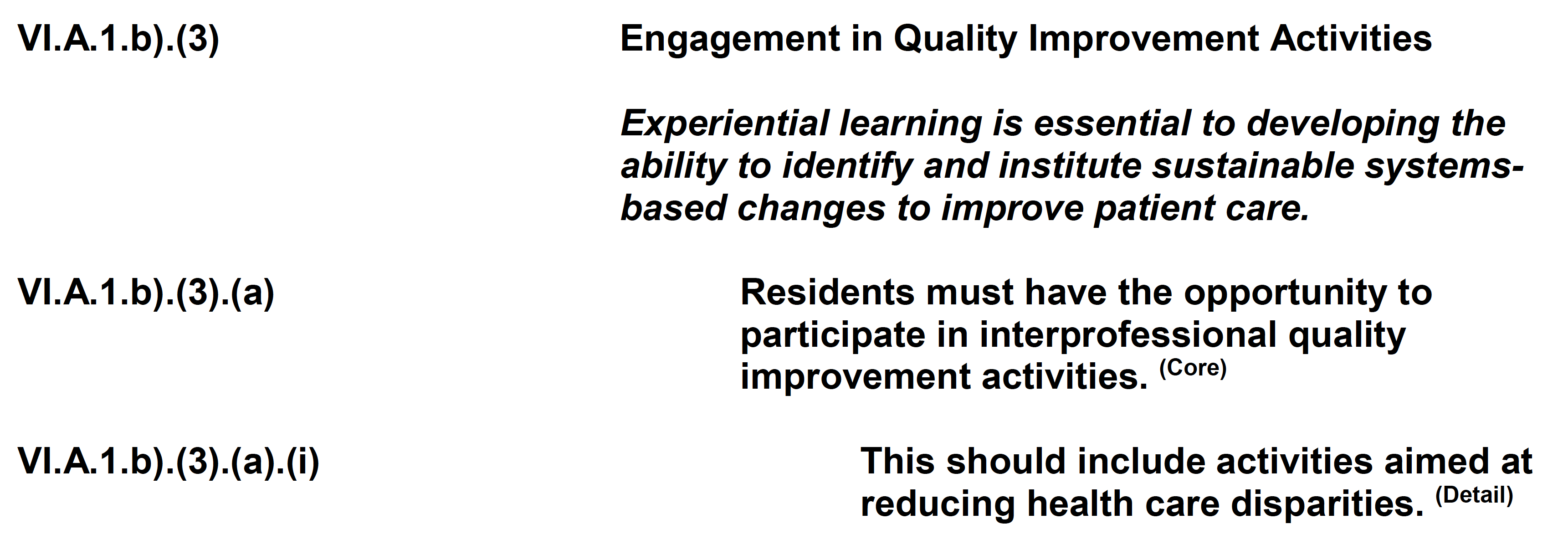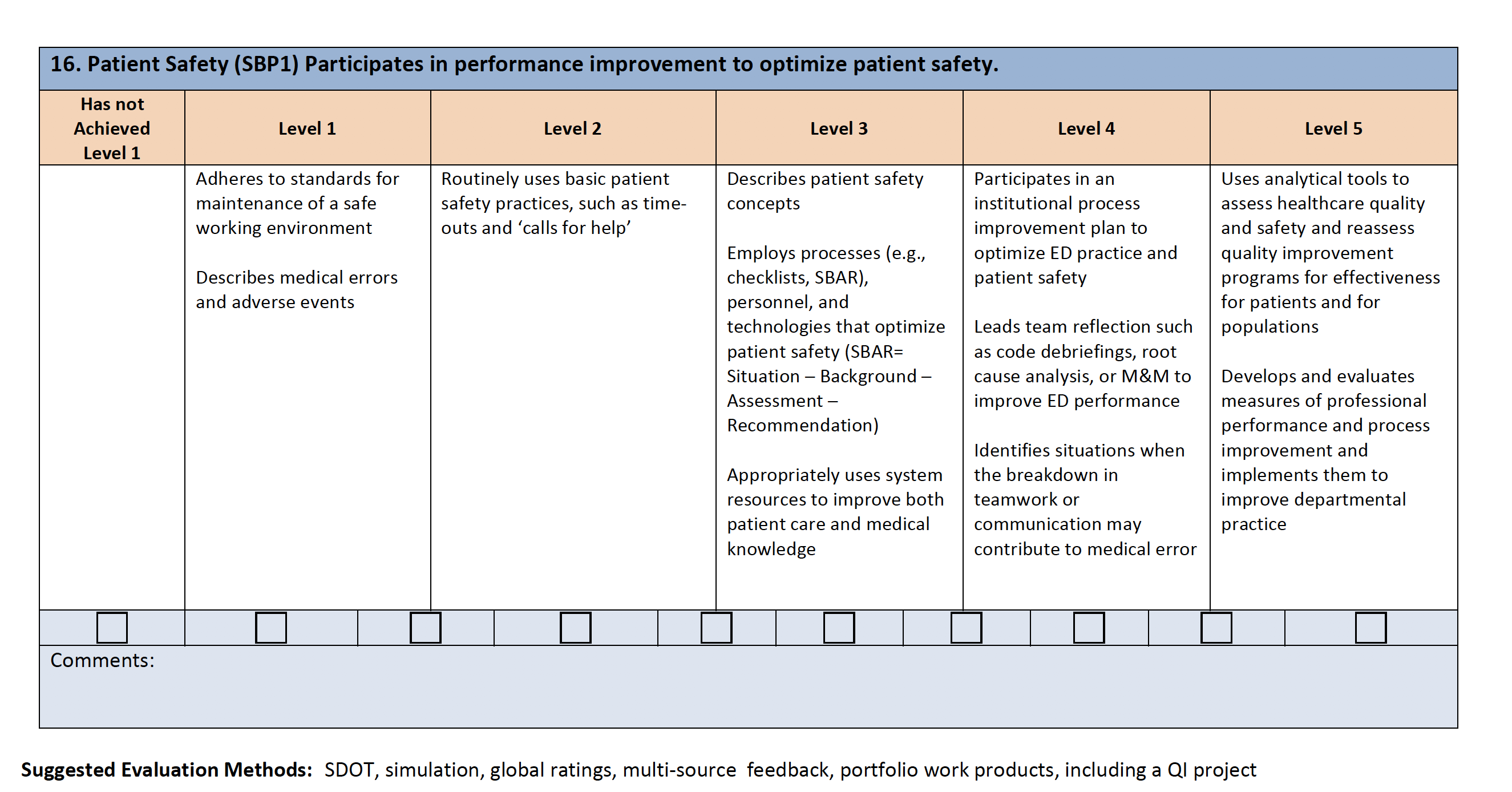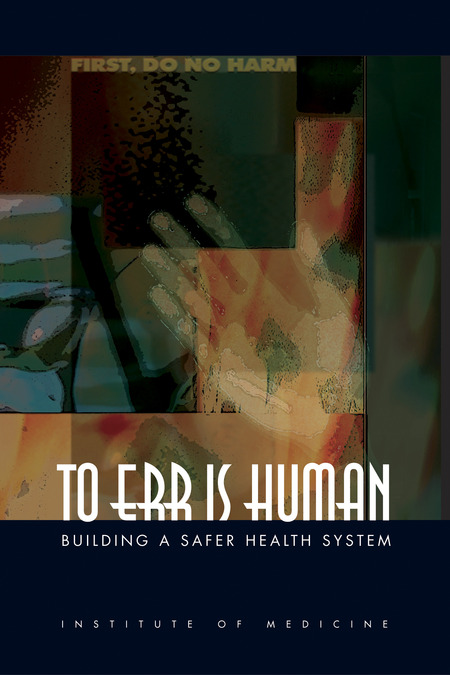
EMERGENCY MEDICINE RESIDENCY PROGRAM, DEPARTMENT OF INTERNAL MEDICINE
USF MORSANI COM, TAMPA GENERAL HOSPITAL, IN PARTNERSHIP WITH TEAMHEALTH

The ACGME Emergency Medicine Program Requirements specifically state that all residents must receive education in quality improvement.

In addition, ABEM and the ACGME initiated the Emergency Medicine Medicine Milestone Project in July 2015. The milestones target learner development over a longitudinal curriculum.

Not only is quality improvement education required, participation in quality improvement processesdevelops a well rounded physician with interdisciplinary citizenship, improved understanding of hospital and practice plan goals and preparation for changing reimbursement models and responsibilities to report QI activity as an attending for payment and compliance purposes.

The ED leadership team as USF/TGH/TEAMhealth is actively involved across the hospital, university, and contract management group in numerous continuous quality improvement activities as well as patient safety projects and initiatives. Simply stated, we are leaders in quality and many of us have added training in appropriate analytical methods to consider how interventions improve quality.
The USF Emergency Medicine Longitudinal Quality curriculum derives from the lessons of the groundbreaking book, To Err is Human and adds the concept of patient value (i.e. LEAN, Six Sigma) to a rigorous analytical process with methods developed at the Institute for Healthcare Improvement (IHI).
USF EM residents become engaged patient quality providers by participating in the longitudinal program that involves didactic sessions, module learning (beginning summer 2018), and responsibility on specific interdisciplinary quality committees throughout the hospital.
In conjunction with the program director, Dr. Charlotte Derr, Dr. Jason Wilson, the associate medical director and research director, ensures that all milestones in relation to CQI are exceeded by graduation and that a high quality, high reliability mentality remains a part of USF Emergency Medicine culture and care delivery.
USF Emergency Medicine Residents will
- All USF Emergency Medicine Residents (PGY 1-3) always practice high quality, team based patient care at all times (Milestone Level 1)
- All USF Emergency Medicine Residents (PGY 1-3) always report medical errors and potential system failures to medical director, quality director, or anonymously through the USF GME Reporting System or the TGH Portal (Milestone Level 1,3)
- All USF Emergency Medicine Residents (PGY 1-3) always give adequate time for an informed consent process that may be verbal, written or both and also will always participate in a “time-out” before a procedure and a “pause for the cause” (Milestone Level 2)
- All USF Emergency Medicine Residents (PGY 1-3) always participate in patient sign out utilizing an SBAR like format at shift change with documentation of sign out in the medical record (Milestone Level 3)
- All incoming interns will join a patient quality improvement team. PGY 1-3 will remain on these teams all 3 years of residency (see team descriptions below). Each resident will develop a quality improvement project with the TGH team coordinator and the Research Director/Associate Medical Director, Jason Wilson, MD.f1
- A team member from the PGY 1-3 classes will represent the ED at all scheduled meetings for that team at the hospital level. Each team member will attend at least 2 meetings per year.
- Team members will be responsible for communication of pertinent new committee innovations back to the residency program. Small updates will be provided in the weekly update after a regularly scheduled meeting.
- 2 times a year, each team will also lead a joint grand rounds session with attendance from an invited interdisciplinary group (e.g. Stroke Grand Rounds will be held jointly with the Stroke Neurocritical Care attending, residents and other staff) and will utilize standardized reporting procedures (e.g descriptive statistics, run charts, presentation format, agenda, minutes, and content). Teams are described below.

5 residents per year will have the opportunity to obtain Institute for Healthcare Improvement (IHI) Basic Certificate in Quality and Safety after completion of 13 modules that will take between 13 and 20 hours over the three years of residency. This is a selective opportunity and residents should indicate their interest at the sign up link
- During the PGY1 June-July 2018 period, selected PGY-1 residents will register for a free IHI Open School Account.
- Incoming selected PGY-1 will take QI 101: Introduction to Healthcare Improvement in the IHI Open School. Each module will take between 1 hour and 1.5 hours to complete. In addition, incoming PGY-1 residents will take PS 101: Introduction to Patient Safety which will take approximately 1 hour and 30 minutes to complete as well as PS 102: From Err to Harm as well as PFC 101: Introduction to Person and Family Centered Care
- Selected PGY-2 Residents will complete IHI Open School Modules QI 102: How to Improve with the Model for Improvement, PS 103: Human Factors and Safety, PS 104: Teamwork and Communication in a Culture of Safety
- SelectedPGY-3 Residents on the Research Month will complete modules QI 103: Testing and Measuring Changes with PDSA Cycles, QI 104: Interpretation of Data: Run Charts, Control Charts, and Other Measurement Tools
- SelectedPGY-3 Residents will complete IHI Open Course Modules QI 105: Leading Quality Improvement, and PS 105: Responding to Adverse Events
- Prior to graduation, selected PGY-3 residents will complete module L101: Introduction to Health Care Leadership and TA 101 Introduction to the Triple Aim for Populations
All residents will join a quality team
Teams include:
Cardiac Care (STEMI, Afib, CHF, Low Risk Chest Pain)
SIGN UP FOR THIS GROUP
- 6 Chest Pain Meetings Per Year
- 4 Afib Meetings Per Year
- 2 CHF Meetings Per Year
- 4 Low Risk Chest Pain Meetings Per Year
- 2 Joint Cardiology USF-EM Grand Rounds Sessions (team members will organize and review ECG alerts from prior 6 months using descriptive statistics, run charts and other standardized techniques)
- Milestone Level 5
Sepsis
SIGN UP FOR THIS GROUP
- 12 Sepsis Meetings Per Year
- Participate and lead efforts of engagement in the ACEP EQUAL initiative
- 4 Length of Stay Sepsis Meetings Per Year
- 6 USF GME Sepsis Meetings Per Year
- 2 Grand Rounds dates (1 hour each) will be dedicated to review of sepsis outcomes and compliance using descriptive statistics, run charts and other standardized techniques)
- Milestone Level 5
- there is an ongoing joint TGH/USF Sepsis QI Project
Transitions of Care (Sickle Cell Disease and Observation Medicine)
SIGN UP FOR THIS GROUP
- 12 Observation/Transition of Care Meetings
- Responsibility in design, implementation and outcome monitoring of novel care paths (e.g. Afib, concussion, VTE, SCD)
- 2 Grand Rounds dates (1 hour each) will be dedicated to review of carepath outcomes, observation protocols and procedures and outcomes using descriptive statistics, run charts and other standardized techniques)
- Milestone Level 5
Stroke
SIGN UP FOR THIS GROUP
- 4 stroke meetings per year
- responsibility in working with ED flow committee to implement changes to stroke pathways, signatures on stroke order sets and new polices
- 2 Grand Rounds Dates each year (1 hour each) – review previous 6 month stroke alert data. Meet with Karen Wilson BEFORE presentation. Utilize descriptive statistics, run charts and other standardized techniques)
- Milestone Level 5
Critical Care
SIGN UP FOR THIS GROUP
- 12 Critical Care Committee Meetings per year
- 2 Grand Rounds Dates each year (1 hour each) – review all patients that were upgraded to ICU after observation or admission from ED prior 6 months, review all ICU admissions from previous 6 months using descriptive statistics, run charts and other standardized techniques)
- Milestone Level 5
HIV/HCV/STIs
SIGN UP FOR THIS GROUP
- ensures that ED is follows CDC guidelines for HIV, HCV, and STI testing
- ensures that ED initiate appropriate empiric treatment for STI
- ensures appropriate community linkage to care programs are in place for HIV/HCV/STI
- monitors screening/linkage/treatment rates over time utilizing descriptive statistics, run charts and other standardized techniques to present ED operational throughput data to the residency program
Trauma
SIGN UP FOR THIS GROUP
- 6 Grand Rounds Per Year. Organize and lead bi-monthly trauma conference, review all trauma alerts, activations and pod upgrades utilizing descriptive statistics, run charts and other standardized techniques)
- liaison with trauma faculty regarding trauma book updates
- other special projects as assigned (Aeromed? EMS?)
- Milestone Level 5
ACEP E-QUAL & ED Flow/Throughput/IT/EMR Processes
SIGN UP FOR THIS GROUP
-
- Participate and lead efforts of engagement in the ACEP Non-Sepsis EQUAL initiatives
- 2 Grand Rounds Per Year (1 hour each) will be dedicated to communicating new initiatives, equal data and intergroup efforts to improve IT processes
- attend biweekly EPIC meeting (approximately 20 per year)
- understand utilize descriptive statistics, run charts and other standardized techniques to present ED operational throughput data to the residency program
- Milestone Level 5
Patient Experience
SIGN UP FOR THIS GROUP
- attend biweekly PEER meeting with ED RNs (approximately 20 per year)
- discuss patient complaints, when asked by attending representative, with peers to understand clinical situation and barriers to meeting patient expectations
- analyze patterns of data in weekly patient comment reports and utilize descriptive statistics, run charts and other standardized techniques to present ED operational throughput data to the residency program
- 2 Grand Rounds Per Year will be dedicated (1 hour each) to presenting patient experience and satisfaction data
- Patients shadowing is a key activity that leads to understanding of patient value, failure-mode analysis and the possibility for errors and unmet expectations secondary to miscommunications. After a resident has been present for more than 6 months, patient shadowing becomes difficult as the resident becomes known to staff. Thus, all PGY-1 incoming residents will spend time shadowing 2 different patients from the beginning to the end of the patient visit (or 4 hours each patient), prior to the patient interaction with a physician. Residents should create a free IHI account and take the PFC 201 Patient Shadowing Course Prior to this experience. Course completion is 30 minutes (Milestone Level 4)
- In addition, Members of the patient experience should complete IHI PFC 102: Key Dimensions of Patient and Family Centered Care during the PGY-1 year, PFC 103: Incorporating Mindfulness into Clinical Practice should be completed during the PGY-2 year and PFC 201 and 202 should be completed during the PGY-3 year.
- Milestone Level 5
PREHOSPITAL aND DISASTER MEDICINE
SIGN UP FOR THIS GROUP
- participate in prehospital simulation drills and drill planning
- review prehospital quality review cases as directed by TFR Medical Director
- Attend trauma county meeting or other meetings as designated by TFR Medical Director
RADIOLOGY and BEDSIDE Ultrasound
SIGN UP FOR THIS GROUP
- work with u/s director to create and maintain quality review system for reviewing resident u/s images
- work with Medical Director, U/S Director, AFMD to create appropriate U/S billing strategies as appropriate
- review wet read to final read changes and pathway for alerting MD, staff, and patients
- monitor wet read X-ray documentation by physicians
- attend radiology meetings and work with radiology service line as appropriate
- work with ED leadership to monitor and develop imaging stratification scores in the medical record
- participate in national benchmarking platforms (e.g. Vizient and E-QUAL) to monitor imaging use
- work with TGH IT to optimize imaging orders
Quality Meeting/Activity Calendar
USF GME Quality Improvement Toolkit